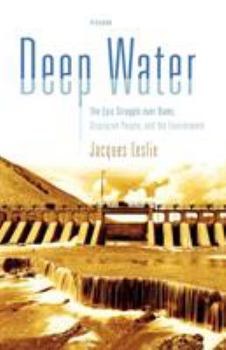Deep Water: The Epic Struggle Over Dams, Displaced People, and the Environment
Select Format
Select Condition 
Book Overview
A Discover Magazine Top Science Book of the Year A Northern California Book Award Finalist There are more than 45,000 of them in the world. They have altered the speed of the planet's rotation, the tilt of its axis, and the shape of its gravitational field. They influence landscapes and societies. They are dams, and in Deep Water, Jacques Leslie offers an incisive, searching, and beautifully written account of the emerging crisis over dams and the...
Format:Paperback
Language:English
ISBN:0312425562
ISBN13:9780312425562
Release Date:November 2006
Publisher:St. Martins Press-3PL
Length:368 Pages
Weight:0.75 lbs.
Dimensions:0.9" x 5.5" x 8.5"
Related Subjects
Biological Sciences Biology & Life Sciences Business & Finance Earth Sciences Ecology Economics Engineering Environment Environmental Economics Environmental Science Environmental Studies History & Philosophy Industries & Professions Natural Resources Nature Nature & Ecology Oil & Energy Science Science & Math Science & Scientists Science & Technology Technology Textbooks Water Supply & Land UseCustomer Reviews
3 ratings
Good implicit indictment of dams, but could have gone farther, and weak on solutions
Published by Thriftbooks.com User , 17 years ago
This book examines the consequences of large dams around the world. Leslie has constructed his book much like John McPhee's classic _Encounters with the Archdruid_. Whereas _Encounters_ had environmentalist David Brower confront three environmental "villains," Leslie simply hangs out with three would-be heroes: an anti-dam activist, a consultant who works on the human consequences of dams, and a water-system manager who is trying to manage the system in an environmentally responsible way. The first third of the book looks at activist Medha Patkar and her efforts to stop the dam on the Narmada River at Sardar Sarovar. This was the first project the World Bank ever left before it was finished, though it is still being built without Bank support. The second third examines Thayer Scudder, an anthropologist who got started in the dam business by studying a people in Zambia whose homeland was destroyed by a dam. After this, he was often hired as a consultant on (underfunded) resettlement projects - - someone who could propose remediation in exchange for giving his support. He spent his career searching in vain for a good dam, always optimistic that a properly-managed dam would be good for people. Ironically, his greatest success came in stopping a bad dam at the Okavango Delta, not helping a good one. The final third of the book looks at Don Blackmore, a water manager who is trying to make Australia's huge Murray-Darling project sustainable. Like McPhee, Leslie tries to stay in the background and let his three characters speak. Leslie clearly admires the commitment of the anti-dam activists; in contrast, he all but calls Scudder a sell-out. However, it's interesting that he concludes with Blackmore, the most powerful and pragmatic of the three. Though Leslie doesn't spin it this way, this book provides a "damming" indictment of engineers. They love playing with their toys, and if anything goes wrong they simply blame "politics" or "greed." But Leslie makes clear that, even when a dam helps some people, it comes at the cost of harming a lot of people whose lives are destroyed by the reservoir - - to say nothing of a damaged ecosystem. This means that dams cannot be anything but "political" because the winners will lobby for the dam and the losers will try to stop it. Leslie doesn't examine dam financing but it is equally, and inevitably political: taxpayers (or aid donors) pay for a project that helps some people but not others. Why, exactly, should everyone give money to help only a few? The book could be used to make a good case for free market environmentalism: if dam builders had to compensate all the people harmed, both upstream and downstream, and pay for the dam out of their own pockets, no dams would be built. They are neither individually profitable nor socially beneficial. They exist only because they benefit wealthy people - - and engineers. The only question that remains is what we should do with the dams we have. L
A fine addition not just to college-level collections, but to general-interest libraries as well.
Published by Thriftbooks.com User , 17 years ago
DEEP WATER: THE EPIC STRUGGLE OVER DAMS, DISPLAYED PEOPLE, AND THE ENVIRONMENT charts the emerging crisis over dams and world water resources, using three figures - an anti-dam activist, an American anthropologist and an Australian water manager - to survey sites of the world's controversial dams. It's a hard-hitting survey tracing the effects of dams upon the common person, upon social and political institutions and choices, and upon world communities, and as such makes a fine addition not just to college-level collections, but to general-interest libraries as well. Diane C. Donovan California Bookwatch
A Modern View of The Cadillac Desert
Published by Thriftbooks.com User , 19 years ago
In the United States the building of large dams has basically ceased. The failure of the Teton Dam in Idaho and the publication of the seminal book 'The Cadillac Desert' pointed out that the construction of such dams had gone far enough. Of course the fact that most of the best sites had already been used may have had something to do with it. This book brings the same study to what is going on in other parts of the world, specifically India, Southern Africa and Australia. Each of the three main sections takes on one of these regions from the viewpoint of the dams. In the epilogue of the book the author finally gets to express his view of the future. A view of the time when the dams are full of sediment, collapsing because of the aging concrete -- as he calls it, the ultimate litter. As he says, the future will look back on the dam building era, the automobile era, our time as an anomoly in the history of the world.






